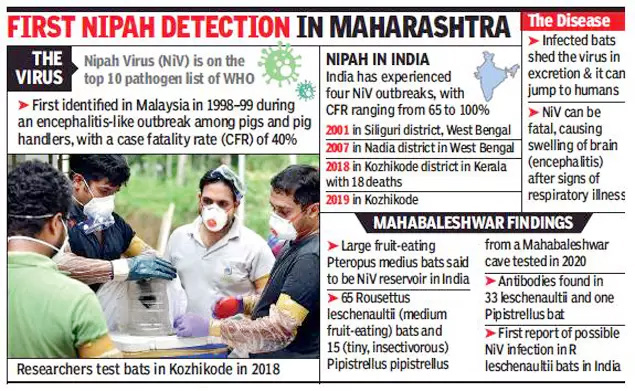Science & Technology
Antibodies against Nipah Virus in Bats
- 22 Jun 2021
- 3 min read
Why in News
A recent survey has found the presence of antibodies against the Nipah virus (NiV) in some bat species from a cave in Mahabaleshwar, a popular hill station in Maharashtra.
- The survey was conducted by the Indian Council of Medical Research (ICMR) - National Institute of Virology (NIV).
Key Points
- About the Survey:
- The NIV team looked at Rousettus leschenaultii and Pipistrellus pipistrellus bats that are common in India.
- Pteropus medius bats, which are large fruit-eating bats, are the reservoir for NiV in India as both NiV RNA and antibodies were detected in the samples of these bats collected during previous NiV outbreaks.
- A bat’s immune system is especially adept at withstanding viral infection because of its ability to limit excessive inflammation — which uniquely allows viruses to thrive without proving deadly to the mammal.
- The NIV team looked at Rousettus leschenaultii and Pipistrellus pipistrellus bats that are common in India.
- Nipah virus (NiV):
- About:
- It is a zoonotic virus (it is transmitted from animals to humans).
- The organism which causes Nipah Virus encephalitis is an RNA or Ribonucleic acid virus of the family Paramyxoviridae, genus Henipavirus, and is closely related to Hendra virus.
- Hendra virus (HeV) infection is a rare emerging zoonosis that causes severe and often fatal disease in both infected horses and humans.
- It first broke out in Malaysia and Singapore in 1998 and 1999.
- It first appeared in domestic pigs and has been found among several species of domestic animals including dogs, cats, goats, horses and sheep.
- Transmission:
- The disease spreads through fruit bats or ‘flying foxes,’ of the genus Pteropus, who are natural reservoir hosts of the Nipah and Hendra viruses.
- The virus is present in bat urine and potentially, bat faeces, saliva, and birthing fluids.
- Symptoms:
- The human infection presents as an encephalitic syndrome marked by fever, headache, drowsiness, disorientation, mental confusion, coma, and potentially death.
- Prevention:
- Currently, there are no vaccines for both humans and animals. Intensive supportive care is given to humans infected by Nipah virus.
- About:





